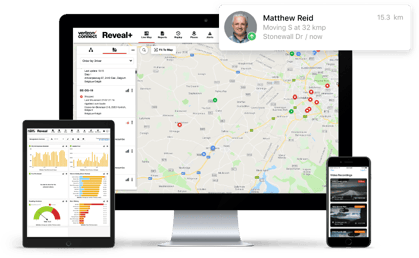Fleet management tech can help boost the services industry
Discover key insights into how fleet management technology can help businesses in the services industry.
Read more
Services play a vital role in the European Union’s economy, representing approximately 70% of its Gross Domestic Product (GDP) and a similar percentage of its employment (1). Although it is an important sector, it is one of the main sectors impacted by the loss of momentum in the EU economy (2).
As the European Commission explains EU GDP growth “is forecast to improve to 1.6% in 2025, this means “a downward revision of 0.1 pps. from winter. In the euro area, GDP growth in 2025 is projected to be slightly lower, at 1.4% - also marginally revised down” (3).
This slow recovery also impacts the services industry that will have a challenging year in front. Despite this predicted slight recovery, businesses will encounter numerous obstacles in maintaining competitiveness (4).
The current economic climate is also expected to continue facing difficulties this year. Companies in the service sector should focus on establishing a strong foundation and critically reviewing their operational efficiency, performance, cost-effectiveness, environmental sustainability, and fleet emissions. Additionally, they should prioritise developing a strategy that centres around customer satisfaction to be able to enhance their overall performance.
The good news is that advanced telematics technology can help transform businesses in the service industry to work in a smart manner.
Let’s dive into what the future of the service industry looks like:
Everyday responsibilities often prevent fleet managers from having the time to assess the performance of their vehicle fleet. If they were to use sophisticated fleet management technology, they would be able to obtain both a comprehensive and detailed view of the areas where operational costs could be reduced.
A good starting point for any company is to have a detailed overview of its operating costs. This includes knowing the fleet’s total fuel usage and the specific fuel consumption for each vehicle, the cost per operation, and identifying hidden costs that not only increase fuel consumption but also put the safety of equipment and vehicles at risk.
Factors such as excessive speeding, prolonged vehicle idling, insufficient vehicle maintenance, and suboptimal route planning could be diminishing the profitability of the business and unnecessarily increasing operational costs.
Regularly analysing operational efficiency is essential for businesses to enhance cost-effectiveness, strengthen their competitive edge and increase profitability.
In fact, companies in the service industry that have implemented telematics have managed to achieve reductions in fuel costs (22%), accident costs (20%), labour costs (20%), vehicle maintenance costs (14%), and insurance costs (22%).
Download the new Advanced Fleet Management for the Services Industry 2025 and discover how GPS tracking technologies are shaping the service industry.
Customer centric culture is a game changer for the service industry, which is why it’s necessary to provide accurate ETAs (estimated time of arrival) to build trust with customers in the service provided. By sharing meaningful information with customers, they become more engaged in the process, gaining insight and exerting a degree of control over the scheduled operation and service.
This extra level of trust can help promote customer retention and loyalty, which is key for companies.
According to our latest Fleet Technology Trends survey, fleets in the service industry in Europe improved their customer service by 55% after implementing telematics technology.
Download the new Advanced Fleet Management for the Services Industry 2025 and discover how GPS tracking technologies are improving the day-to-day operations of companies in the service industry.
Safety must be a fundamental pillar for any responsible company. Promoting a safe environment where workers can carry out their activities in safe conditions is essential.
For businesses that rely on vehicle use, factors like ensuring vehicles are well-maintained, selecting safe routes, and effectively planning the workday are crucial to keeping the equipment in a safe working condition.
Advanced telematics can help you in all these areas, which is a great way to prioritise the safety of your team and enables you to improve safety measures in a comprehensive way.
In fact, the latest Fleet Technology Trends Survey in Europe revealed that 43% of European fleets improved driver safety habits and 36% decreased speeding and harsh driving with the help of an advanced fleet management solution.
https://www.verizonconnect.com/ie/resources/report/services-industry-2025/and discover how asset tracking benefits businesses.
Tags: Cost control, Customer service, Productivity & efficiency




Find out how our platform gives you the visibility you need to get more done.
Discover key insights into how fleet management technology can help businesses in the services industry.
Read moreTracking the location of your fleet with a vehicle tracking system can help you achieve your goals. Learn three ways...
Read moreHow GPS fleet tracking can help streamline your operations
Read moreTransform your safety and improve customer service and productivity with GPS fleet tracking technology.
Read more